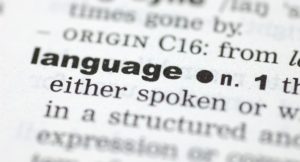
Clementine has a funny way with language. She has said quite a few words, probably 10, then never used them again after a few days. It was one of the ways I knew she was probably autistic, although neither of the other autistic kids did that.
Faith, the oldest to be diagnosed and most likely to pass as neurotypical, spoke early and often. She was ahead of the curve and used language very well. She was unable to function typically in social settings unless the other children were odd-kid-friendly, but we didn’t really notice that until she was about 12. With one exception. She had no idea how to initiate conversation, but could usually carry her end as long as the other kid was outgoing and kind. Once, when she was in a bounce house at about age seven or so, she tried initiating a conversation with another girl by going into an elaborate, scripted play she often played with Abby. The other child looked concerned, and walked (bounced) away. Faith followed, and just kept saying the same thing. That was our first inkling that she was not your average bear, wiring-wise. But language acquisition was normal to advanced.*
Bede, on the other hand, spoke nary a word until he was almost two, and that was to read aloud. We were thrilled he was reading (and he was really reading, we tested him with just about any one, two or three syllable word) but really wished he would actually communicate and use his language functionally. His first functional word was “cracker!” and was followed the next week by “Pop-Tart!” He was three. Words trickled in and speech trickled out over years and years, and now he has something approaching normal use of language. Approaching – probably 80% normal. But the 20% that’s weird is really weird. Also, his prosody and tone is way, way off and it’s obvious in about three or four words that he is autistic.
But back to Clementine. She is two. She has said ball, block, milk, cheese-it, apple, banana, meow, eggs, shoes, cheese. Of those, we have kept apple. The others all left. Some have come back: cheese, ball. The only one she uses to ask for something is cheese. Now, that’s not to say she lacks language, just none of it is used to communicate or share experiences. She knows all the letters – upper and lower case – and all the numerals as well as 10. Are those words? Sure! And we love saying them with her, and she sometimes seems to delight in our doing so. But they don’t do anything in her environment; they don’t make things happen. I think if we keep saying them when she does, and playing with them (sometimes jokingly getting them wrong, speaking in a silly voice, speaking slowly or quickly, etc) she’ll learn a lot about how communication works in an indirect way. At the same time of course we will still be modeling pragmatic, functional speech. As she drags us to the refrigerator, “Oh, you want some milk? Milk? I’ll get you some milk! Here is milk.” As we are leaving the house, “Here are shoes! Shoes on feet! Let’s go!” And so on. She’ll see that the labels work to share ideas.
Then it’s off to the races!
*Faith read this and approved publication.
This sounds so familiar. Susan didn’t really use language to express thoughts until she was about 6. Prior to that she’d say words, she knew Cat and Cookie and Water, and she could count and say the alphabet. Actually, when she was maybe 2 or so (I know she was still in her crib) I was playing with her and just said the alphabet backwards. She got a very puzzled look on her face for a bit, then smiled and, on her very first try, recited the alphabet backwards laughing. Through about 1st grade, or so, she’d use the phrase “Want water.” In a few cases, she actually did want water. Most of the time, though, “Want water” meant “I’m overwhelmed and I need you go leave me alone for a few minutes, about the amount of time it’d take for you to go get me a cup of water.” It was confusing to the uninitiated, and it would be so frustrating to her if the person she said it to would send someone else for water and not leave her alone. It’s a natural desire to stay and comfort a child who’s clearly in distress, but she really needed to just be left alone. She always had big problems with open ended questions. “Do you want to go to the park?” was difficult to answer. If we’d ask “Do you want to go to the park or stay home?” she could immediately answer. She’s 17 now, and I still find myself doing that, asking all questions with closed options. She doesn’t really need me to any more, but it’s just become such a hard habit to break. Also, it is still much easier for her to answer those type of question, so asking them in that way does take some stress off of her.